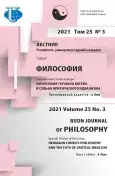Landscape Philosophy in Relation to the Description of Contemporary Society and its Environment
- Authors: Milykh A.O.1
-
Affiliations:
- Lomonosov Moscow State University
- Issue: Vol 25, No 3 (2021): HERMANN COHEN'S PHILOSOPHY AND THE FATE OF CRITICAL IDEALISM
- Pages: 545-553
- Section: SCHOLARLY LIFE
- URL: https://journal-vniispk.ru/2313-2302/article/view/325021
- DOI: https://doi.org/10.22363/2313-2302-2021-25-3-545-553
- ID: 325021
Cite item
Full Text
Abstract
The article discusses the features of landscape philosophy, as well as the prospects of its practical application to analyze the crises of modern society associated with the scientific and technological revolution, globalization and the massification of culture. The concept of landscape becomes particularly important in connection with the urban turn in philosophy. The analysis given in this article has shown that landscape philosophy explains the negative characteristics of colonial cognition. The interpretation of the concept of space in landscape philosophy is considered. Following S. Goryainov, we consider landscape philosophy as a philosophy of crisis. Our analysis has shown that landscape philosophy contributes to the approbation of models for solving the crisis of language and mind. Landscape philosophy and philosophical anthropology reveal existential problems. The works of M. de Unamuno, M. Scheler, M. Foucault and V. Podoroga were analyzed in this context. The significance of Unamuno's philosophy for the analysis of the role of individual creative space in the contemporary world is revealed. The applicability of Scheler's concept of spirit for the analysis of the problems of landscape philosophy is revealed. It is proved that within the framework of Podoroga's landscape philosophy, the problem of the correlation of politics and political. Using the concepts of utopia, atopia, and heterotopia, various aspects of the crisis of contemporary man man associated with the transformation of the subject's identity, the fragmentation of meanings and significance are studied. Thus, Podoroga's works are valuable for crisis philosophy because they analyze both spatial and political aspects of the crisis of contemporary society. Podoroga's works make it possible to reflect the contradictions of contemporary society, which ensures the prospects of their application for the analysis of changes in the contemporary social space.
Keywords
About the authors
Alexander O. Milykh
Lomonosov Moscow State University
Author for correspondence.
Email: books-93@mail.ru
Postgraduate student at the Department of social philosophy and philosophy of history, philosophy department
27, Lomonosovsky prospect, Moscow, 119991, Russian FederationReferences
- Weinstein E. The core of the spiral. The experience of informal philosophy. Мoscow; 1994. (In Russian).
- Ogurcov AP. Place. The New Philosophical Encyclopedia. Available from: https://iphlib.ru/library/collection/newphilenc/document/HASH01a2e36eb7712afccbbe65a2?p.s=TextQuery (In Russian).
- Podoroga VA. Expression and meaning. Landscape worlds of philosophy: Kierkegaard, Nietzsche, Heidegger, Proust, Kafka. Moscow: Ad Marginem; 1995. (In Russian).
- Nikolaenko VL, Nikolaenko LG. The sociology of culture. The short dictionary. Kiev; 2011. 577 p. (In Russian).
- Goryajnov SA. The philosophy of landscape. Prolegomena to the philosophy of the XXI century. Available from: http://philosophystorm.org/filosofiya-landshafta-filosofiya-kak-geografiya-bytiya (In Russian).
- Goryajnov SA. Landscape paradigm. Available from: https://psycheforum.ru/topic/ 106563-landshaftnaya-paradigma-iz-filosofii-landshafta/ (In Russian).
- Unamuno M de. Selected works in two volumes. Vol. 2. Leningrad: 1981. (In Russian).
- Sheler M. The position of man in space. In the problem of man in Western philosophy. Moscow: Progress; 1988. P. 31—95.
- Foucault M. Different spaces. Intellectuals and the authorities selected political articles, speeches and interviews. Moscow: Praksis; 2006. Part 3. P. 191—204.
- Podoroga VA. The apology of the political. M.: Publishing house of the State University of the Higher School of Economics, 2010. (In Russian).
- Grafsky VG. About the peculiarity of the Soviet legal culture. Works of the Institute of State and Law of the Russian Academy of Sciences. 2011; (4):130—152. (In Russian).
Supplementary files









